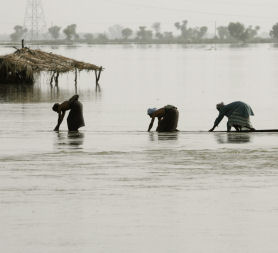Pakistan floods: clean water desperately needed
Updated on 28 August 2010
A month after the flooding disaster in Pakistan began, more areas are at risk of a new deluge and the humanitarian crisis continues, with clean water and medical aid desperately needed, as Medecins Sans Frontieres writes for Channel 4 News.

The projects I am involved with for Medecins Sans Frontieres (MSF) are in two provinces: in the southern part of Balochistan (Nafarbad, Jalafalbad districts) and in Sindh province, in Sukkur, Pierluigi Testa, country representative for MSF in Pakistan, writes for Channel 4 News.
The biggest humanitarian need at the moment is access to medical care and clean, safe water for the flood affected population.
MSF has already stepped up clean water distribution activities in the main towns and remote villages of Khyber Pakhtunkhwa's Charssada, Swat, Nowshera, Lower Dir and Dargai. And now we plan to do the same in Sindh and Balochistan. Across Pakistan, MSF is now providing at least 540,000 litres of safe water a day.
Only two days ago I took a helicopter from Sukkur in Sindh all the way to Balochistan - and all I could see was an inland sea.
Only water was visible for 300 kilometres and village after submerged village with people still stuck on rooftops.
This is a particularly isolated region and one that seems to be not gaining the attention it deserves. It is a region that is normally characterised by its dry desert landscape and now there is only water as far as the eye can see – this area alone is roughly the same size of my home country, Italy.
How to donate
To make a donation to Medecins Sans Frontieres, go to http://www.msf.org.uk/donate
In our daily consultations in Sindh and Balochistan, around 15-20 per cent of them are dealing with cases of acute watery diarrhoea. In an effort to prevent more cases we are distributing hygiene kits and non-food-items in order to give families a chance to build shelter and improve their own hygiene conditions.
Kits include the very basics required to survive in these extreme conditions, things like buckets, soap, laundry soap, tooth brush, jerry can, hygiene items for women, towel, plastic mugs, kitchen utensils, plastic sheeting, tents and mattress as well as water purification tablets.
In response to this increase of diarrhoea, we are also running a Diarrhoea Treatment Centre (DTC) in Dera Murad Jamali (DMJ) in Baluchistan. In total MSF has set up six DTCs, the remaining located in Swat, Lower Dir, Malakand, Hangu, and Kot Addu.
Malnutrition is also becoming a problem too. After nearly three weeks of running mobile clinics in Balochistan we already treated 400 severely malnourished children. Unfortunately, I expect to see rates of malnutrition to increase across Sindh and Balochistan because crops have been destroyed by flood waters and humanitarian actors are not here because of security and authorisations required to operate on the ground.
Find all of Channel 4 News' reports on the Pakistan floods here
In Sukkur we are now supporting a 30-bed paediatric ward for children under 5 years of age and today I can announce that we are opening an intensive therapeutic feeding centre for children suffering malnutrition with serious medical complications.
If we see the same trend of recent days (where we treated on average 35 new cases of severely malnourished children under the age of five per day) then we expect the unit to be full in the near future. These are worrying signs as MSF.
In most of the areas I have visited so far I must acknowledge the impressive response to the floods by the local communities and organisations. These are mainly local religious organisations who are very effective at reaching the population, however I believe that this is still not enough. The magnitude of needs, particularly in Sindh and Balochistan where I have spent most of my time, remains extremely high.
MSF volunteers currently conduct medical activities in more than 15 locations in Khyber Pakhtunkhwa, Federally Administered Tribal Areas, Punjab, Balochistan and Sindh provinces.
With more than 1,200 national and 100 international staff in Pakistan, MSF is currently scaling up its response to the flood disaster.
Pierluigi Testa, country representative for MSF in Pakistan.









